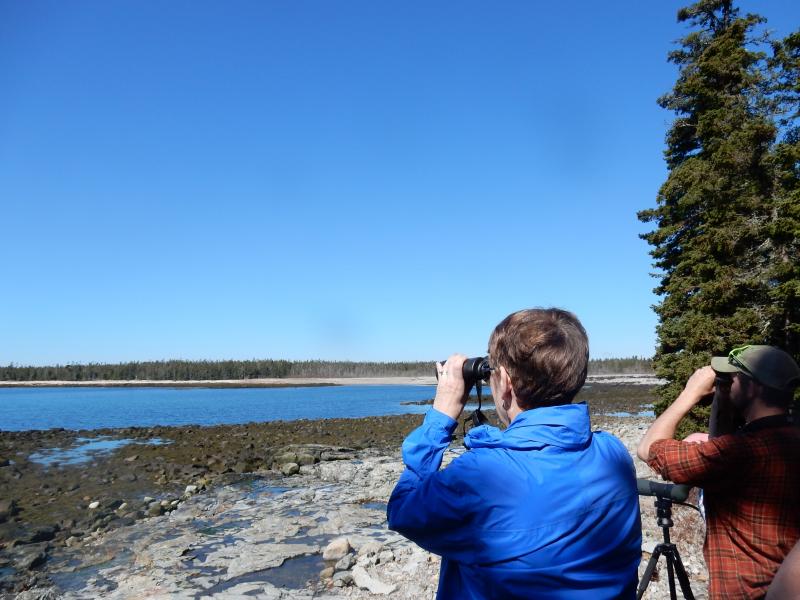Celebrating birds and birders
On Saturday morning, May 16, we led a bird walk at Acadia National Park, a special Natural Resources Council of Maine event planned to honor the park’s centennial, and to celebrate International Migratory Bird Day (IMBD). IMBD was created to highlight the fact that birds know no boundaries; as such, bird conservation needs to be international in scope. IMBD is celebrated in all 50 states, and in Canada, Mexico, Central and South America, and the Caribbean.
For us, celebrating IMBD this year was also an opportunity to celebrate birders. On Saturday, were joined by several dozen of them, from towns in the vicinity and beyond who came together to enjoy a morning of birding. As we met and greeted each other in the parking lot, we all began tipping our heads to the treetops. We scanned to see the northern parula giving its buzzy rising trill in nearby spruces, and keying in on the loud, ringing of the black-and-white warbler, also singing nearby, even as we were applying sunscreen or otherwise prepping for our outing. Few of us knew each other in advance of the event, but it didn’t take long for that to change.
Birds do that to people. They bring them together, not just because we all appreciate the beauty and behaviors of these fascinating creatures. We like to think the birds also remind us of our common values. From our experience, it’s pretty much a given that people who enjoy birds also want to protect them, and that includes their habitats. They understand that birds just don’t magically appear, even though it may seem that way on a sunny Saturday morning in May. In reality, those birds traveled thousands of miles to get to the shores of Acadia, and had many more miles to go to reach their final breeding grounds. They relied on vibrant lands and clean waters to sustain their international journeys. As the planet has become more degraded by pollution from a wide range of sources, and more and more habitat is gobbled up by human encroachment, we can’t take our lands and waters for granted.
Most, if not all, of the two dozen or so birders we spent our morning with are members of national, maybe even international conservation groups. Some also belong to their local land trusts; maybe they serve on their town’s conservation committee. All are supporters of the Natural Resources Council of Maine, given that Saturday’s event was sponsored by NRCM, which leads efforts statewide to protect our state’s land, air, waters, and wildlife. Just as the birds didn’t magically appear, neither does land magically get saved. Nor do clean, healthy lakes and streams magically stay that way. Recycling ordinances don’t magically manifest themselves. All of these are the result of efforts by people who support NRCM and other groups who strive to protect the environment. They not only provide financial support by many take other actions as well, such as writing letters to their local paper and attending public hearings on issues that matter to them.
On Monday, two days following our bird walk, more than 1,000 people attended a listening session at the University of Maine hosted by Senator Angus King and featuring National Park Service Director Jonathan Jarvis. The gathering was focused on a proposed new national monument for Maine, and the overwhelming majority were there to show their support for this tremendous opportunity. Those who opposed had their reasons, just as those who opposed Acadia and other national monuments and parks had theirs. In those cases, supporters prevailed, and history shows that we are all the better for that, because protecting special places is good not only for birds but also for people.
Our visit to Acadia Saturday morning with a passionate group of birders made that point endlessly clear.
Jeffrey V. Wells, Ph.D., is a Fellow of the Cornell Lab of Ornithology. Dr. Wells is one of the nation's leading bird experts and conservation biologists and author of the “Birder’s Conservation Handbook.” His grandfather, the late John Chase, was a columnist for the Boothbay Register for many years. Allison Childs Wells, formerly of the Cornell Lab of Ornithology, is a senior director at the Natural Resources Council of Maine, a nonprofit membership organization working statewide to protect the nature of Maine. Both are widely published natural history writers and are the authors of the book, “Maine’s Favorite Birds.”





























.png)
.png)

